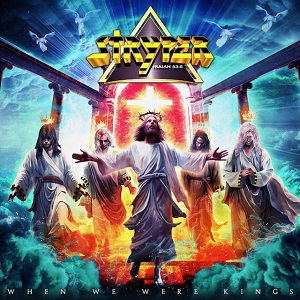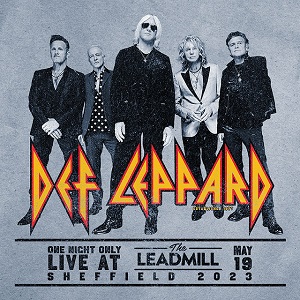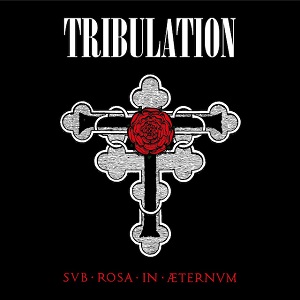Happy 30th Birthday Holy Diver: RONNIE JAMES DIO - “It Had A Song For Everybody”
May 25, 2013, 11 years ago
By Martin Popoff
In honour of the 30th anniversary of DIO’s heavy metal classic Holy Diver (released May 25, 1983), BraveWords is exclusively running the following excerpt from Martin Popoff’s book Dio: Light Beyond The Black, available from Martinpopoff.com.

Recalls future Dio guitarist CRAIG GOLDY, in a recent chat with Martin commemorating the reissue of Magica, when asked if he had ever seen Ronnie nervous about the direction of his career, “The only thing I ever remember was this one time where he seemed a little nervous, because he had left BLACK SABBATH, and it was during the Holy Diver recordings. It was over at his house, and he pulled me aside and played something and asked me what I think, and he kind of... he seemed nervous. For the first time I saw him as being kind of nervous about what are people going to think, what are they going to say? And to me, it seemed obvious how great it was, because it was. At the time, Holy Diver had everything. There were certain songs... to me it had a song for everybody. You know, people who were musicians had something to glean from it. People who are musicians had something they could glean from it. It was unique, it was one-of-a-kind, and it was just odd to see him kind of almost question himself for the first time, that I’d ever known him. That didn't last for long, because he soon said, ‘I'm not going to worry about it. It is what it is.’ And then it just took off (laughs).”

Excerpt from Dio: Light Beyond The Black (still, surprisingly, the only book on the career of the Dio band):
Chapter 2: Holy Diver – “We had Vinny in kind of a log cabin."
Always a leader but never quite allowed to lead, save back to ELF, RONNIE JAMES DIO, now double famous through Rainbow and Sabbath, found himself the buzz of the town, folks genuinely excited about what might come next out of this diminutive metal roarer.
After the debacle surrounding Black Sabbath’s Live Evil album, it was no surprise that Ronnie would take the other Italian New Yorker from that band, Vinny Appice, off to forge fire with Ronnie, but with who the heck else?
“Once I was able to do what I wanted on my own,” recalls Ronnie, “which was to have my own band that I had some control over, then all the revolving door stuff that went on in the past stopped. When you know that if it were done a different way that it could be better, and it never does get done a different way, then it becomes frustrating for you. It is hard not being in control when you think that you know what you are doing. In the case of Rainbow, it was Ritchie’s band and that’s the way it should have been. In Sabbath, it was all of us and it was pretty democratic. Sometimes it’s hard to be democratic. You don’t always make the right decisions when three people want to do it and one person doesn’t want to do it. I’m not saying that is what happened in Sabbath. We were always very democratic but it was hard to be that way.”
Brooklyn, NY’s Vinny Appice had come up in the ranks well within the shadow of his more famous brother Carmine Appice, mostly known for his work with Vanilla Fudge, Jeff Beck, Beck, Bogert & Appice and Cactus. Vinny’s main claim to fame by the time he joined Dio would be, of course, his stint in Black Sabbath. But as well as that, he had been with unsuccessful one-record acts Bruzer (Round 1 - 1982) and Axis (It’s A Circus World - 1978), along with a more esteemed stretch with Rick Derringer for Derringer (1976), Sweet Evil and Live (both 1977). Vinny says of Bruzer, “that was just Ricky Ramirez, a guitar player who was a good friend; he put that together and said ‘Yeah, I'd love you to play on it’ and I said ‘Yeah, let me hear it.’”
“The blue album was my first album,” continues Appice, on the under-rated Derringer record, the truncated name supposed to signify that this was now a band, a heavy band. “But it was really dry, really small-sounding, very tight-sounding.” Derringer was followed by the aforementioned Sweet Evil, to this day one of the world’s all-time hard rock classics – even if nobody much knows about.
“Yeah, that was a good album,” agrees Vin. “For the first record, I was just a naive young kid. It was my first record and we put all those songs together as a band. Well, Rick had a lot of stuff written, but we filled it in, put it that way (laughs). Some stuff we wrote together, but we didn't get credit. Then we went on the road and we became a heavier kind of band, you know? From playing together. We got really tight, but it was heavier. So on the next album, we started writing a little darker. The songs were a little darker, a little heavier, and we got a different producer. Jack Douglas produced that, so the drums were lower, the bass was lower; there's more bottom end to it and it was bigger sounding. There are some good songs on there. I know Sittin' By The Pool was written about L.A., when we came out here. We were a New York band, so to come out here, it was like ‘Oh man,’ that L.A. vibe. Everyone was so laid-back, but I liked it. I thought man, this place is cool. So did Danny Johnson, who played guitar. I just remember that Danny came up with Driving Sideways, which is a really cool song (laughs); he wrote some crazy shit. But Rick was more into pop and writing poppy songs. That's why the first album is poppy and happy and the second album got darker. But we were a good band. I don't know… we got a little heavier there and maybe he didn't like where it was going. And then after Derringer broke up, we came out here and formed Axis and did one record. We formed out here because it was a lot easier to do business in L.A.”
However, through al that recording and touring, one of Vinny’s fondest experiences reaches way back to the beginning, with his band being called in from the studio next door, on a whim (Vinny was 16 at the time), to provide handclaps for John Lennon on Whatever Gets You Through The Night, the first of a few minor jobs Vinny did for the now martyred legend.
“Why isn't Vinny still in the band?” queried Ronnie in 1983, referring to the recently cleavered Black Sabbath. “That's because he's with me and he's treated with respect for what he is, a great person and a fantastic drummer. Anyone who could do what he did in three days has to be incredible. I don't want this to sound like a British and American split because it isn't. Or else why would I have Jimmy who's Scotch, and Viv, who's Irish, in the band?”Vivian Campbell’s pre-Dio history is brief, and will be discussed, er, shortly, but Jimmy Bain’s background bears more telling. Jimmy really was known more as a session guy leading up to his work with Dio. Rattling around Scotland, London and even British Columbia, Jimmy began his career with knockabout bands like Harlot and Street Noise before winning the Rainbow gig. Jimmy then recorded Rising, On Stage, and parts of Long Live Rock ‘n’ Roll for the mercurial man in black. Sessions with Kate Bush ensued, for Bush’s groundbreaking The Dreaming record, along with John Cale and Phil Lynott, both for Phil’s carousing semi-serious act Greedy Bastards and for his infinitely more elegant and plush solo records. But Jimmy’s main pride and joy at that time was his minor supergroup formed at the height of the NWOBHM, Wild Horses. That band also featured Thin Lizzy’s Brian Robertson, and through an alcoholic haze, the geezers recorded two albums, The First Album in 1980 and Stand Your Ground in 1981. As we’ll hear, concurrent with his work on the monumental first Dio record, Jimmy also guested on Scorpions’ Love At First Sting.

Jimmy confirms the wild times had by all in Wild Horses, his band just prior to landing the Dio gig. “Oh yeah! And Brian’s from Scotland as well. I met him when I was in my band Harlot, before Rainbow, and I stayed pretty close to him. After I got the boot from Rainbow I went straight back to England the next day. And he had been in some kind of skirmish and he couldn't play with Lizzy for awhile and they were using Gary Moore. So him and I got together and we kind of clicked and wrote some songs and went in and demoed them. He was with Thin Lizzy's management and my best friend was Phil Lynott as well, the late lead singer for Thin Lizzy. So I kind of had this idea that Phil and Robo had had this head-to-head thing that was never ever going to be sorted out. Basically it worked kind of good for me because Phil was basically telling me ‘If you're going to work with that creep, good luck to you!’ But I kind of liked it. It was craziness, but we managed to get a record deal and put out a couple of records, one of which was produced by Trevor Rabin. I liked it because I got to sing and we wrote all the stuff. It was a lot of fun and it was a little crazy too. And you know, at that time when we were in London, you couldn't get arrested if you were playing anything heavy. It was kind of punky and rebellious and we were playing the wrong kind of music at the time. But it was a lot of fun.”
“Phil Lynott was just unbelievable,” recalls Jimmy fondly, adding commentary about these other great ‘80s sessions just prior to his joining Dio. “I was on tour with Dio and I came back that Christmas that he got sick. He's my daughter's godfather; we were really tight. I was born the same day as his eldest daughter, Sarah, and our wives were really tight, close together. We lived… I don't know, three or four miles away from each other in London. Actually, I worked and wrote on a couple of his albums, Solo In Solo, and his second one. I wrote Girls with him; I wrote Dear Miss Lonely Hearts with him. And then on the second one, The Philip Lynott Album, I wrote Old Town with him and the one that Mark Knopfler played on, Ode To Liberty, and I played on all that stuff, keyboards, bass, everything. That was a real buzz because he was a real talent. A real talent, and a really a nice guy. Like I say, I was on tour with Dio, and I came back and saw him at Christmas, actually stayed at his house, and I had to leave on Boxing Day. I took his two kids over to see my daughter for Christmas Day and I never saw him again, because he was taken to hospital that day. And I had to leave the day after Christmas and actually fly to Vancouver to pick up the tour again and I didn't get to go to his funeral. And I was really kind of destroyed by that. But these things happen and you never know when you're going to get taken. Pretty amazing.”Before we move on however, it appears that Bob Daisley, who had played with Ronnie on Rainbow’s Long Live Rock ‘n’ Roll and extensive touring around that record, had also been asked to join the band (and not for the first time – Ronnie and Bob almost got together before Ronnie joined Sabbath for Heaven And Hell). Says Daisley, “Well, I remember, when I started the thing with Ozzy and Randy and Lee Kerslake, Blizzard Of Ozz, I remember Ronnie and Vinny Appice phoning me up, and then they came around to my flat in London, and we went out for an Indian meal together and a few drinks and what have you, and asked me to join the band, the Dio band. But I had already gotten this thing together with Ozzy and it was doing well, so I didn't really consider it.” Replying to the comment that, as history had it, he couldn’t lose either way, Bob remarks that, “Well, I don't know. I think there was more of an opportunity for writing with the Ozzy thing. Because Ozzy himself isn't really much of a writer. And Ozzy's stuff has done so much better than Dio's stuff. Dio has been successful and he's done well, but not even close to what the Ozzy records did.”
Back at Holy Diver, the original sessions of which Ronnie speaks, just with himself and Vinny, were held at the Californian rehearsal studio where much of Mob Rules was written. “Vinny and I just played in a rehearsal studio, because I wanted to hear what it was going to be like live for me to sing it, so we just played. We had the two songs, Don't Talk To Strangers and Holy Diver, just Vinny and myself. And yes, that is the place where we wrote most of the Mob Rules album, that same place. So after the fact, after not being in Sabbath anymore, we went back to that studio, because we knew the guy who owned the studio and he was a good friend of ours. And we went back there and it was private. I didn't want to go from not being in Sabbath anymore to a place where all ears would be listening to what we were going to do, just for the sake of being one of those paranoid people. I didn't want anybody to hear what we were doing at that time. I mean, we didn't have a guitar player, we didn't have a bass player. It was just Vinny and I at the time and then we had to go and populate the band. So to clarify, I've never written anything that wasn't for either a project that was going to be a band, or the band itself. I'm sure there have been rumours at times that said ‘Oh, I heard that you wrote all of Holy Diver when you were still in Sabbath. Why didn't you give them those songs?’ Well that's actually crap. I've never done that and I never would have and I never will do in my life. So that's just one of those left-handed rumours I guess.”

On the subject of locating Vivian Campbell, the young Irishman who would become Dio’s first guitarist, and to this day the most celebrated, Ronnie offers the following. “Vinny and I had gone to a lot of the clubs but we couldn’t find anybody. I called Jimmy Bain and asked him if he knew any guitar players and he said that he knew two great guitar players. He said he would bring a tape of them over to our hotel room. One was Viv and one was John Sykes. John was brilliant but I really liked the way Viv played. It was rougher and rawer. Viv was in Ireland at the time and Jimmy called and asked him to come down, so I got him a plane ticket for the next day. I got him a room, a place called John Henry’s, and we rehearsed for two nights on Holy Diver and Don’t Talk To Strangers. It was great. I said, ‘Do you want to be in a band, Viv?’ and he said ‘Yeah!’ Jimmy assumed he was the bass player anyway so I didn’t bother to ask him and he didn’t bother to ask us - it was a band! I flew them over two weeks later to L.A.. We started to rehearse and then we recorded it and away we went.” (CRR) Of note, apparently Ronnie had worked with future Ozzy star Jake E. Lee as well, but decided what he needed was a more European sounding axeman.
Also in the area of guitarists, Viv had been up for the Thin Lizzy job, Snowy White having flippantly offered him the job – Viv’s arch-rival John Sykes got the gig instead.
“That probably came from the little mind that said it,” laughed Ronnie in the summer of ’83, responding to Viv’s John Sucks pronouncement. “Viv was pissed that he didn't get the Lizzy gig. I think he assumed it would be his gig because he's Irish and had toured with Lizzy. He thinks Lynott has something against him. After all he's 20-years-old. He'll learn someday won't he? It's wonderful to have a big ego. We'll see how he handles this situation. I choose him because I like him and he's a great player. He has great potential as a person, which is every bit as important as being a great guitar player. There are a lot of good players out there and I turned down a couple because I didn't like them. I don't want to get too much into that. Viv's a totally different player. He's very notey and very wild. Tony is a very unique guitar player, a great rhythm player. He can play full chords with vibrato as opposed to taking the easy way out. As a soloist, he left a lot to be desired. Tony would speed up at the end of a solo because he didn't know how to finish it off. After working with Ritchie Blackmore, someone who really knows how to finish a solo, Tony's solos seemed a little mundane.”Continues Ronnie, settling a few scores, “One thing I won't lay down about any longer is the Black Sabbath situation. I'll answer any questions you have. You should hear my side of the story and you can believe whatever you want. I've been asked many times, why did I leave Rainbow? I chose not to say anything at the time because Ritchie is a friend of mine. And no matter what was written in the press, I never said anything bad. However in the Sabbath situation I have read too many things that I must reply to. If you look at Heaven And Hell you'll notice that the songwriting credits are listed in alphabetical order. It's Butler, Dio, lommi, and Ward. On Mob Rules, after Bill left, it's Butler, Dio, and Iommi. On the live album, now, it's lommi - obviously he's the most important - Butler next, and then it's 'Ronnie Dio,' not even 'Ronnie James Dio,' which is the name that I use. It's easy to see the political references that are going on.”

Detailed info on Dio Light Beyond The Black, as well as Martin’s other 40 or so books, can be found at Martinpopoff.com.
(Dio live photos courtesy of Vinnyappice.com)











